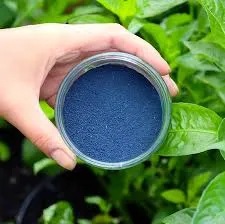Exploring the Benefits and Applications of Pre-reduced Indigo Dye in Textile Industry
The Significance of China Pre-Reduced Indigo Dye
Indigo dye, one of the oldest dyes known to humanity, has rooted itself deeply in various cultures and traditions across the globe. Among the many methods of producing indigo, the pre-reduced indigo dye from China stands out due to its unique properties, rich history, and sustainable practices. This article explores the significance of Chinese pre-reduced indigo dye, emphasizing its cultural heritage, production methods, and contemporary relevance in the textile industry.
Historical Context
Indigo has been utilized for thousands of years, with evidence of its use found in ancient civilizations, including Egypt, India, and Central America. In China, the dyeing process dates back to the Han Dynasty (206 BC - 220 AD), showcasing its long-standing cultural importance. The method of pre-reducing indigo, which involves chemically modifying the dye to render it soluble in water, emerged as a practical solution for dyeing fabrics more efficiently. This advancement allowed artisans to create vivid and consistent shades of indigo, solidifying its role in Chinese textile traditions.
Production Process
The process of creating pre-reduced indigo dye involves several intricate steps. Traditionally, indigo plants, particularly *Indigofera tinctoria*, are harvested and fermented, producing a yellow-green solution known as “indigo vat.” In pre-reduced dyeing, the indigo is treated with reducing agents—often sodium dithionite or other natural substances—to convert it into a soluble form. This form can easily penetrate fibers, allowing for a more uniform color application. Once the dyeing is complete, exposing the fabric to air oxidizes the dye, resulting in the deep blue hues characteristic of indigo clothing.
china pre reduced indigo dye

This method not only ensures rich colors but also enhances the dye's attachment to the fiber, resulting in garments that maintain their vibrancy over time. Compared to traditional indigo dyeing methods, which can be cumbersome and time-consuming, the pre-reduced process streamlines production and reduces waste, making it a more sustainable option.
Cultural Relevance
Chinese pre-reduced indigo dye has played a significant role in traditional garments, particularly in regions like Jiangxi and Shandong, where craftsmanship and textile arts thrive. The iconic blue-and-white designs seen in the fabrics from these areas epitomize the blend of artistry and functionality that embodies Chinese textile traditions. Moreover, indigo dyeing has become a symbol of Chinese heritage, with many artisans striving to keep the ancient craft alive through workshops and cultural preservation initiatives.
In recent years, the global trend towards sustainable fashion has sparked renewed interest in natural dyes, including pre-reduced indigo. Consumers are becoming increasingly aware of the environmental impacts of synthetic dyes, leading to a revival in the use of traditional methods. This burgeoning interest not only supports local artisans but also fosters a deeper appreciation for the rich history and cultural significance of indigo dye.
Conclusion
In conclusion, Chinese pre-reduced indigo dye is not merely a method of coloring fabrics; it is a testament to the richness of cultural heritage, craftsmanship, and sustainable practices. As the textile industry continues to evolve, the revival of traditional dyeing methods like pre-reduced indigo presents an opportunity to reconnect with our history while embracing sustainable innovation. By valuing these age-old practices, we not only preserve them for future generations but also contribute to a more environmentally friendly approach in today’s fashion landscape. Whether woven into garments or used as a design element, pre-reduced indigo dye remains a significant cultural and artistic hallmark, bridging the past with the present.
-
The Timeless Art of Denim Indigo Dye
NewsJul.01,2025
-
The Rise of Sulfur Dyed Denim
NewsJul.01,2025
-
The Rich Revival of the Best Indigo Dye
NewsJul.01,2025
-
The Enduring Strength of Sulphur Black
NewsJul.01,2025
-
The Ancient Art of Chinese Indigo Dye
NewsJul.01,2025
-
Industry Power of Indigo
NewsJul.01,2025
-
Black Sulfur is Leading the Next Wave
NewsJul.01,2025

Sulphur Black
1.Name: sulphur black; Sulfur Black; Sulphur Black 1;
2.Structure formula:
3.Molecule formula: C6H4N2O5
4.CAS No.: 1326-82-5
5.HS code: 32041911
6.Product specification:Appearance:black phosphorus flakes; black liquid

Bromo Indigo; Vat Bromo-Indigo; C.I.Vat Blue 5
1.Name: Bromo indigo; Vat bromo-indigo; C.I.Vat blue 5;
2.Structure formula:
3.Molecule formula: C16H6Br4N2O2
4.CAS No.: 2475-31-2
5.HS code: 3204151000 6.Major usage and instruction: Be mainly used to dye cotton fabrics.

Indigo Blue Vat Blue
1.Name: indigo blue,vat blue 1,
2.Structure formula:
3.Molecule formula: C16H10N2O2
4.. CAS No.: 482-89-3
5.Molecule weight: 262.62
6.HS code: 3204151000
7.Major usage and instruction: Be mainly used to dye cotton fabrics.

